Expatriate Managers' Role in MNEs' International Strategies
VerifiedAdded on 2021/02/21
|11
|3861
|113
Report
AI Summary
This report delves into the crucial role of expatriate managers within multinational enterprises (MNEs) and their contribution to international strategy. The report begins by defining business expansion and the significance of international strategy, highlighting the various roles expatriate managers play, including planning, organizing, staffing, directing, and controlling. It then explores strategies companies can implement to enhance the likelihood of successful expatriate utilization, such as strategic vision, selection and preparation, compensation, tenure, support, repatriation, and professional development. The report further discusses the importance of customer value, high-quality products and services, and excellent service. Academic models, like Hall's High/Low Context Culture model, are used to provide a deeper understanding, supported by real-world examples. The report emphasizes the importance of adapting to cultural differences, ensuring employee satisfaction, and providing consistent support for optimal outcomes in international business ventures.
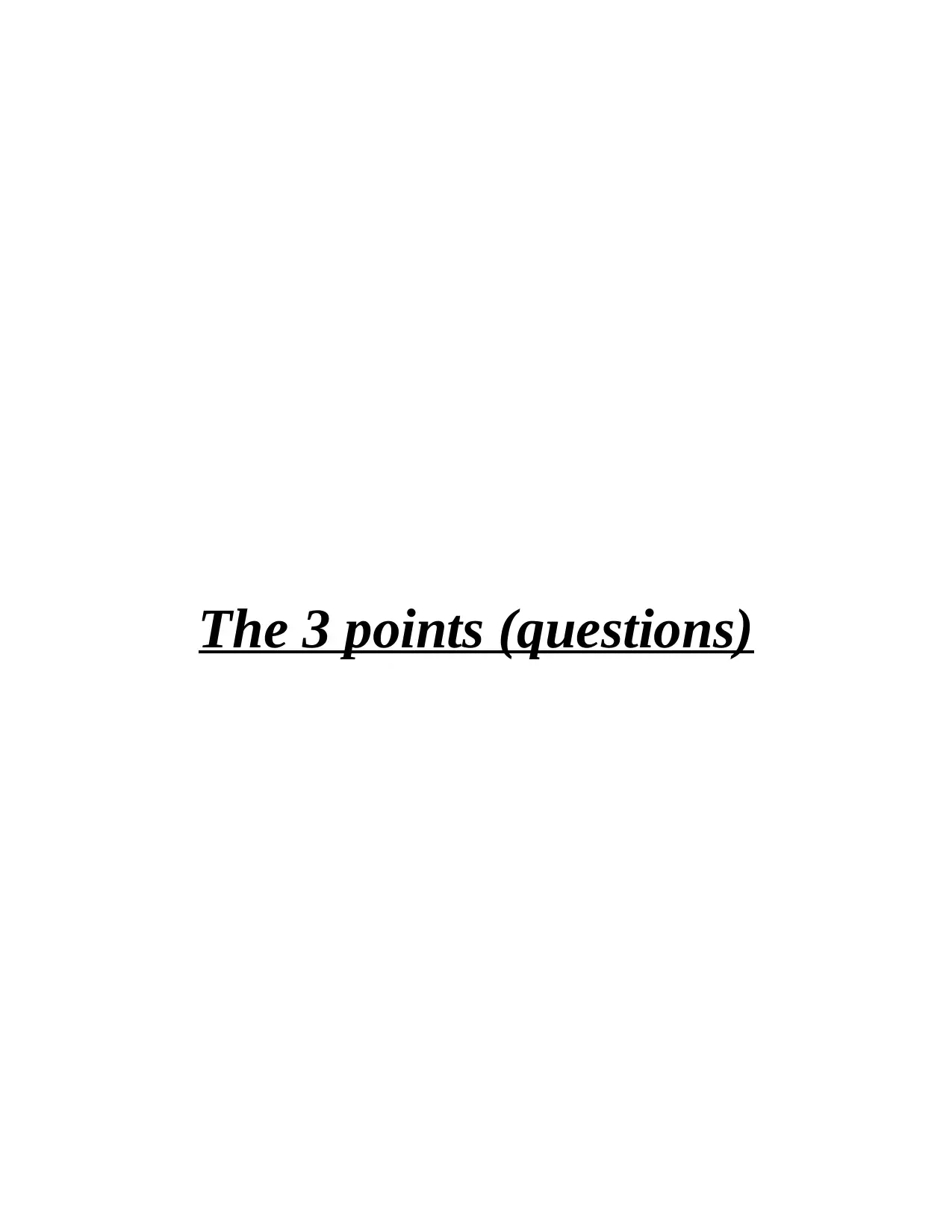
The 3 points (questions)
Paraphrase This Document
Need a fresh take? Get an instant paraphrase of this document with our AI Paraphraser
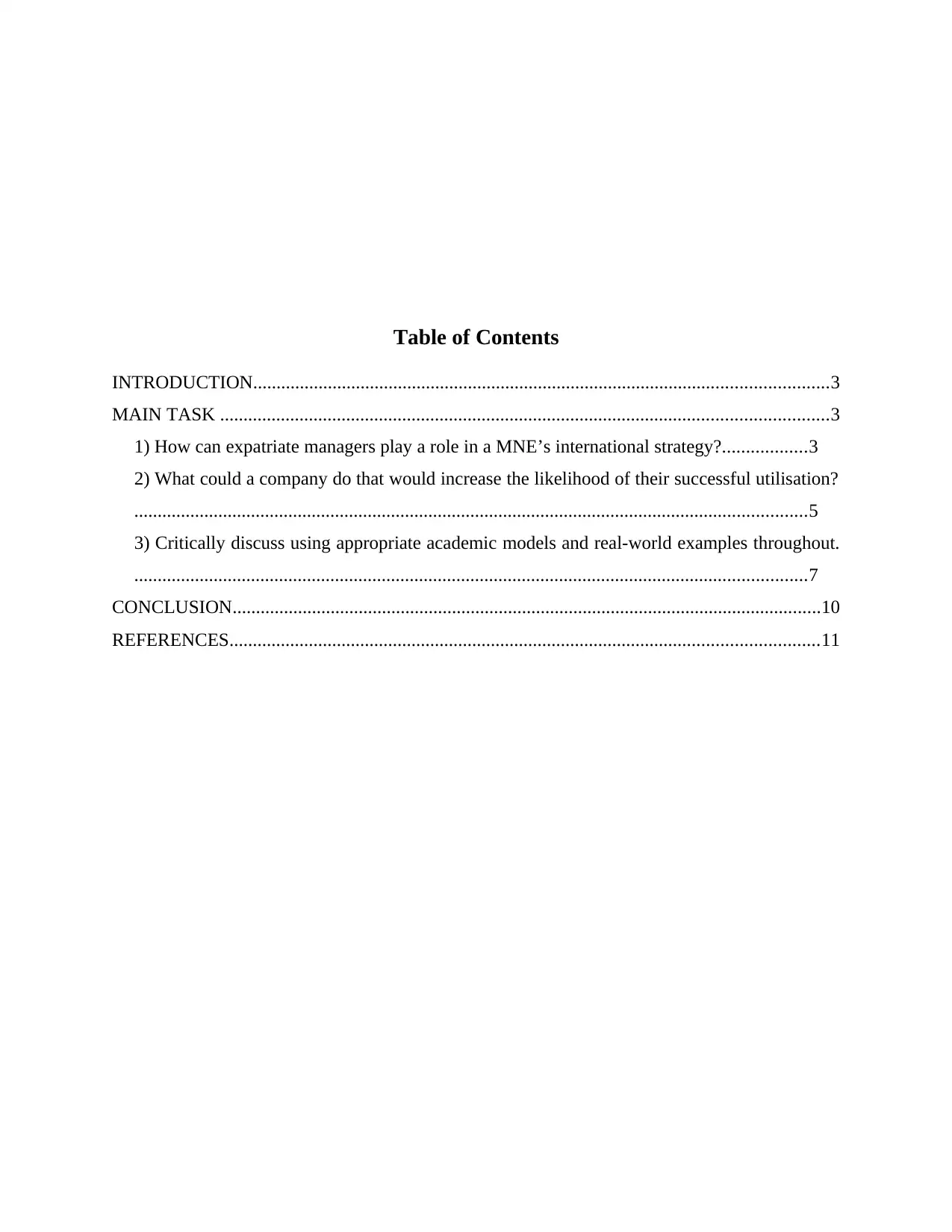
Table of Contents
INTRODUCTION...........................................................................................................................3
MAIN TASK ..................................................................................................................................3
1) How can expatriate managers play a role in a MNE’s international strategy?..................3
2) What could a company do that would increase the likelihood of their successful utilisation?
................................................................................................................................................5
3) Critically discuss using appropriate academic models and real-world examples throughout.
................................................................................................................................................7
CONCLUSION..............................................................................................................................10
REFERENCES..............................................................................................................................11
INTRODUCTION...........................................................................................................................3
MAIN TASK ..................................................................................................................................3
1) How can expatriate managers play a role in a MNE’s international strategy?..................3
2) What could a company do that would increase the likelihood of their successful utilisation?
................................................................................................................................................5
3) Critically discuss using appropriate academic models and real-world examples throughout.
................................................................................................................................................7
CONCLUSION..............................................................................................................................10
REFERENCES..............................................................................................................................11
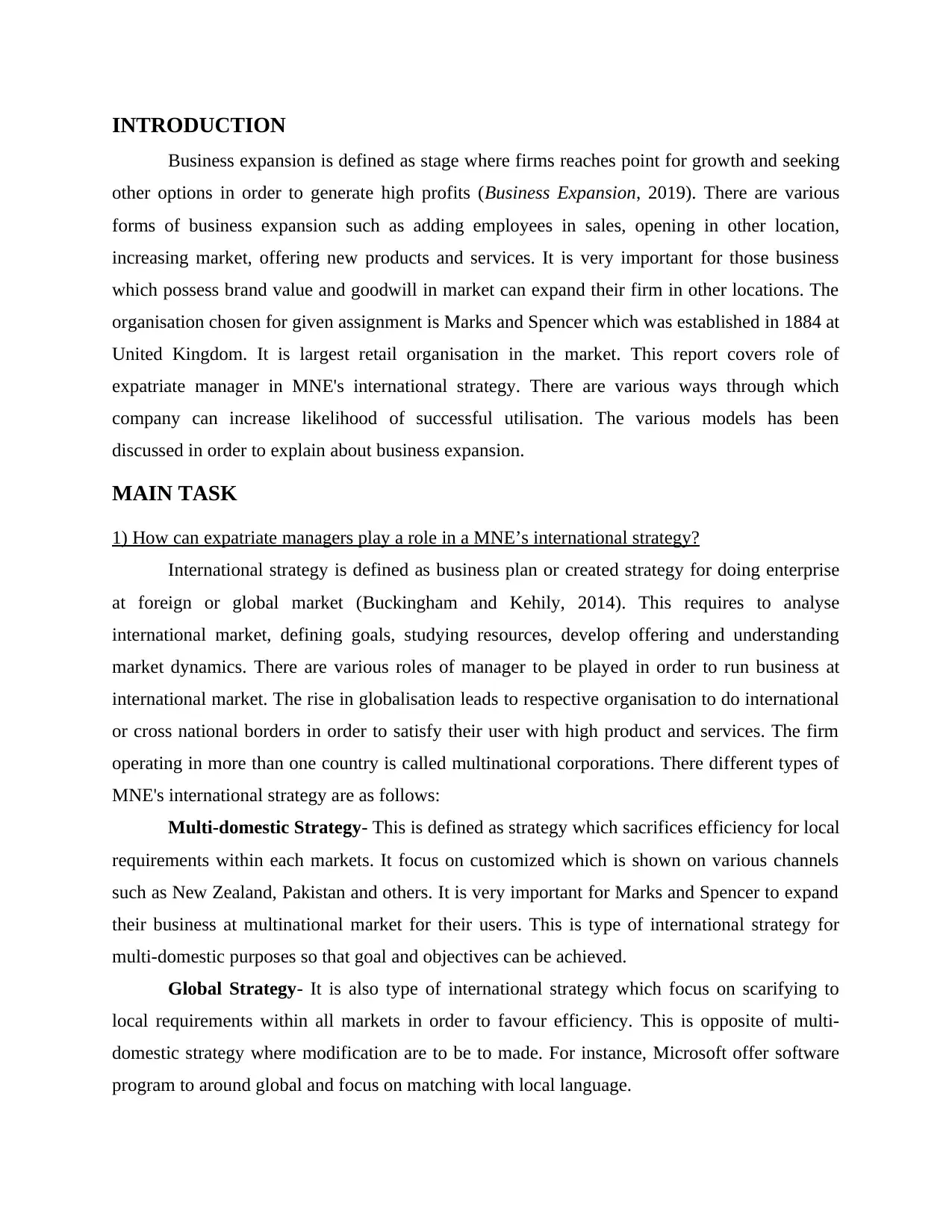
INTRODUCTION
Business expansion is defined as stage where firms reaches point for growth and seeking
other options in order to generate high profits (Business Expansion, 2019). There are various
forms of business expansion such as adding employees in sales, opening in other location,
increasing market, offering new products and services. It is very important for those business
which possess brand value and goodwill in market can expand their firm in other locations. The
organisation chosen for given assignment is Marks and Spencer which was established in 1884 at
United Kingdom. It is largest retail organisation in the market. This report covers role of
expatriate manager in MNE's international strategy. There are various ways through which
company can increase likelihood of successful utilisation. The various models has been
discussed in order to explain about business expansion.
MAIN TASK
1) How can expatriate managers play a role in a MNE’s international strategy?
International strategy is defined as business plan or created strategy for doing enterprise
at foreign or global market (Buckingham and Kehily, 2014). This requires to analyse
international market, defining goals, studying resources, develop offering and understanding
market dynamics. There are various roles of manager to be played in order to run business at
international market. The rise in globalisation leads to respective organisation to do international
or cross national borders in order to satisfy their user with high product and services. The firm
operating in more than one country is called multinational corporations. There different types of
MNE's international strategy are as follows:
Multi-domestic Strategy- This is defined as strategy which sacrifices efficiency for local
requirements within each markets. It focus on customized which is shown on various channels
such as New Zealand, Pakistan and others. It is very important for Marks and Spencer to expand
their business at multinational market for their users. This is type of international strategy for
multi-domestic purposes so that goal and objectives can be achieved.
Global Strategy- It is also type of international strategy which focus on scarifying to
local requirements within all markets in order to favour efficiency. This is opposite of multi-
domestic strategy where modification are to be to made. For instance, Microsoft offer software
program to around global and focus on matching with local language.
Business expansion is defined as stage where firms reaches point for growth and seeking
other options in order to generate high profits (Business Expansion, 2019). There are various
forms of business expansion such as adding employees in sales, opening in other location,
increasing market, offering new products and services. It is very important for those business
which possess brand value and goodwill in market can expand their firm in other locations. The
organisation chosen for given assignment is Marks and Spencer which was established in 1884 at
United Kingdom. It is largest retail organisation in the market. This report covers role of
expatriate manager in MNE's international strategy. There are various ways through which
company can increase likelihood of successful utilisation. The various models has been
discussed in order to explain about business expansion.
MAIN TASK
1) How can expatriate managers play a role in a MNE’s international strategy?
International strategy is defined as business plan or created strategy for doing enterprise
at foreign or global market (Buckingham and Kehily, 2014). This requires to analyse
international market, defining goals, studying resources, develop offering and understanding
market dynamics. There are various roles of manager to be played in order to run business at
international market. The rise in globalisation leads to respective organisation to do international
or cross national borders in order to satisfy their user with high product and services. The firm
operating in more than one country is called multinational corporations. There different types of
MNE's international strategy are as follows:
Multi-domestic Strategy- This is defined as strategy which sacrifices efficiency for local
requirements within each markets. It focus on customized which is shown on various channels
such as New Zealand, Pakistan and others. It is very important for Marks and Spencer to expand
their business at multinational market for their users. This is type of international strategy for
multi-domestic purposes so that goal and objectives can be achieved.
Global Strategy- It is also type of international strategy which focus on scarifying to
local requirements within all markets in order to favour efficiency. This is opposite of multi-
domestic strategy where modification are to be to made. For instance, Microsoft offer software
program to around global and focus on matching with local language.
⊘ This is a preview!⊘
Do you want full access?
Subscribe today to unlock all pages.

Trusted by 1+ million students worldwide
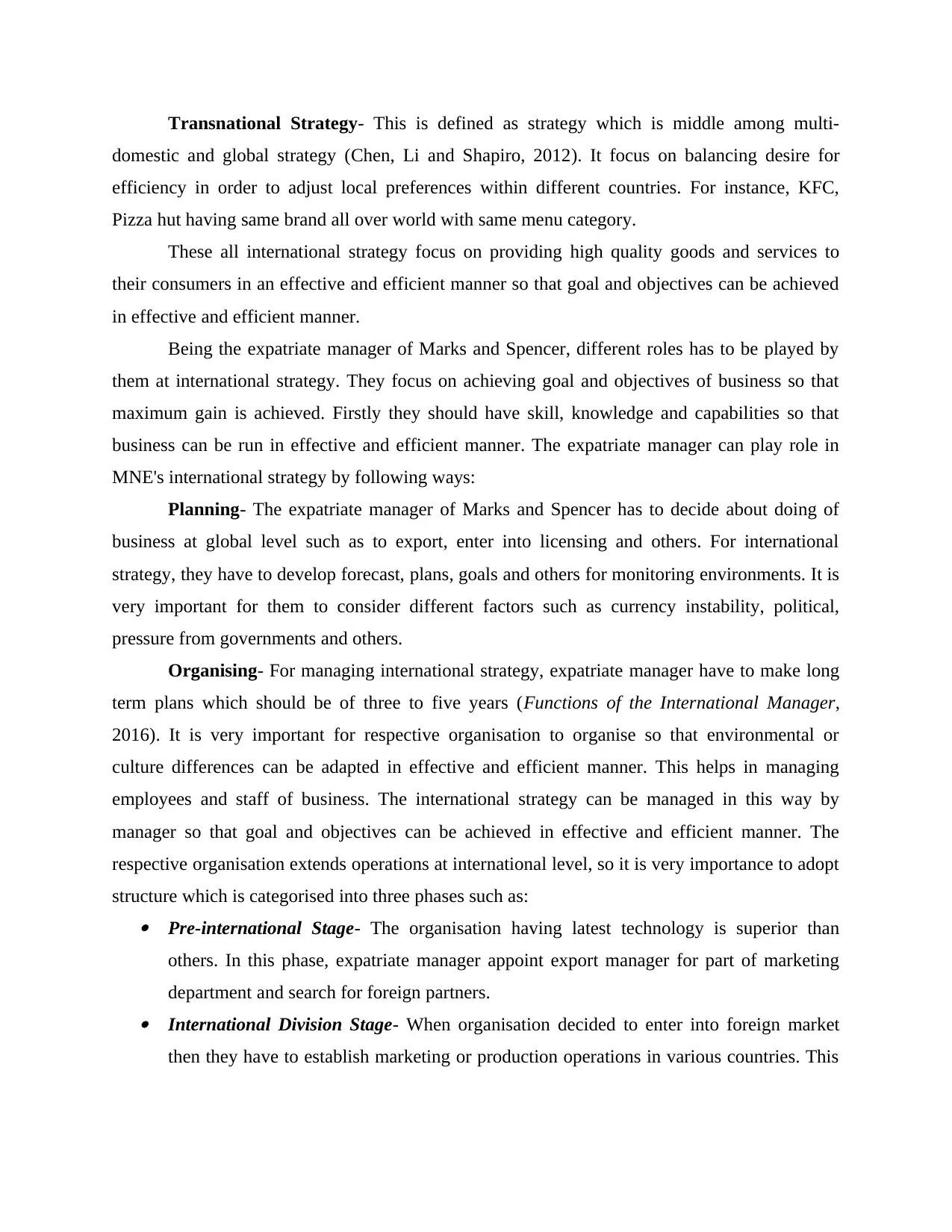
Transnational Strategy- This is defined as strategy which is middle among multi-
domestic and global strategy (Chen, Li and Shapiro, 2012). It focus on balancing desire for
efficiency in order to adjust local preferences within different countries. For instance, KFC,
Pizza hut having same brand all over world with same menu category.
These all international strategy focus on providing high quality goods and services to
their consumers in an effective and efficient manner so that goal and objectives can be achieved
in effective and efficient manner.
Being the expatriate manager of Marks and Spencer, different roles has to be played by
them at international strategy. They focus on achieving goal and objectives of business so that
maximum gain is achieved. Firstly they should have skill, knowledge and capabilities so that
business can be run in effective and efficient manner. The expatriate manager can play role in
MNE's international strategy by following ways:
Planning- The expatriate manager of Marks and Spencer has to decide about doing of
business at global level such as to export, enter into licensing and others. For international
strategy, they have to develop forecast, plans, goals and others for monitoring environments. It is
very important for them to consider different factors such as currency instability, political,
pressure from governments and others.
Organising- For managing international strategy, expatriate manager have to make long
term plans which should be of three to five years (Functions of the International Manager,
2016). It is very important for respective organisation to organise so that environmental or
culture differences can be adapted in effective and efficient manner. This helps in managing
employees and staff of business. The international strategy can be managed in this way by
manager so that goal and objectives can be achieved in effective and efficient manner. The
respective organisation extends operations at international level, so it is very importance to adopt
structure which is categorised into three phases such as: Pre-international Stage- The organisation having latest technology is superior than
others. In this phase, expatriate manager appoint export manager for part of marketing
department and search for foreign partners. International Division Stage- When organisation decided to enter into foreign market
then they have to establish marketing or production operations in various countries. This
domestic and global strategy (Chen, Li and Shapiro, 2012). It focus on balancing desire for
efficiency in order to adjust local preferences within different countries. For instance, KFC,
Pizza hut having same brand all over world with same menu category.
These all international strategy focus on providing high quality goods and services to
their consumers in an effective and efficient manner so that goal and objectives can be achieved
in effective and efficient manner.
Being the expatriate manager of Marks and Spencer, different roles has to be played by
them at international strategy. They focus on achieving goal and objectives of business so that
maximum gain is achieved. Firstly they should have skill, knowledge and capabilities so that
business can be run in effective and efficient manner. The expatriate manager can play role in
MNE's international strategy by following ways:
Planning- The expatriate manager of Marks and Spencer has to decide about doing of
business at global level such as to export, enter into licensing and others. For international
strategy, they have to develop forecast, plans, goals and others for monitoring environments. It is
very important for them to consider different factors such as currency instability, political,
pressure from governments and others.
Organising- For managing international strategy, expatriate manager have to make long
term plans which should be of three to five years (Functions of the International Manager,
2016). It is very important for respective organisation to organise so that environmental or
culture differences can be adapted in effective and efficient manner. This helps in managing
employees and staff of business. The international strategy can be managed in this way by
manager so that goal and objectives can be achieved in effective and efficient manner. The
respective organisation extends operations at international level, so it is very importance to adopt
structure which is categorised into three phases such as: Pre-international Stage- The organisation having latest technology is superior than
others. In this phase, expatriate manager appoint export manager for part of marketing
department and search for foreign partners. International Division Stage- When organisation decided to enter into foreign market
then they have to establish marketing or production operations in various countries. This
Paraphrase This Document
Need a fresh take? Get an instant paraphrase of this document with our AI Paraphraser
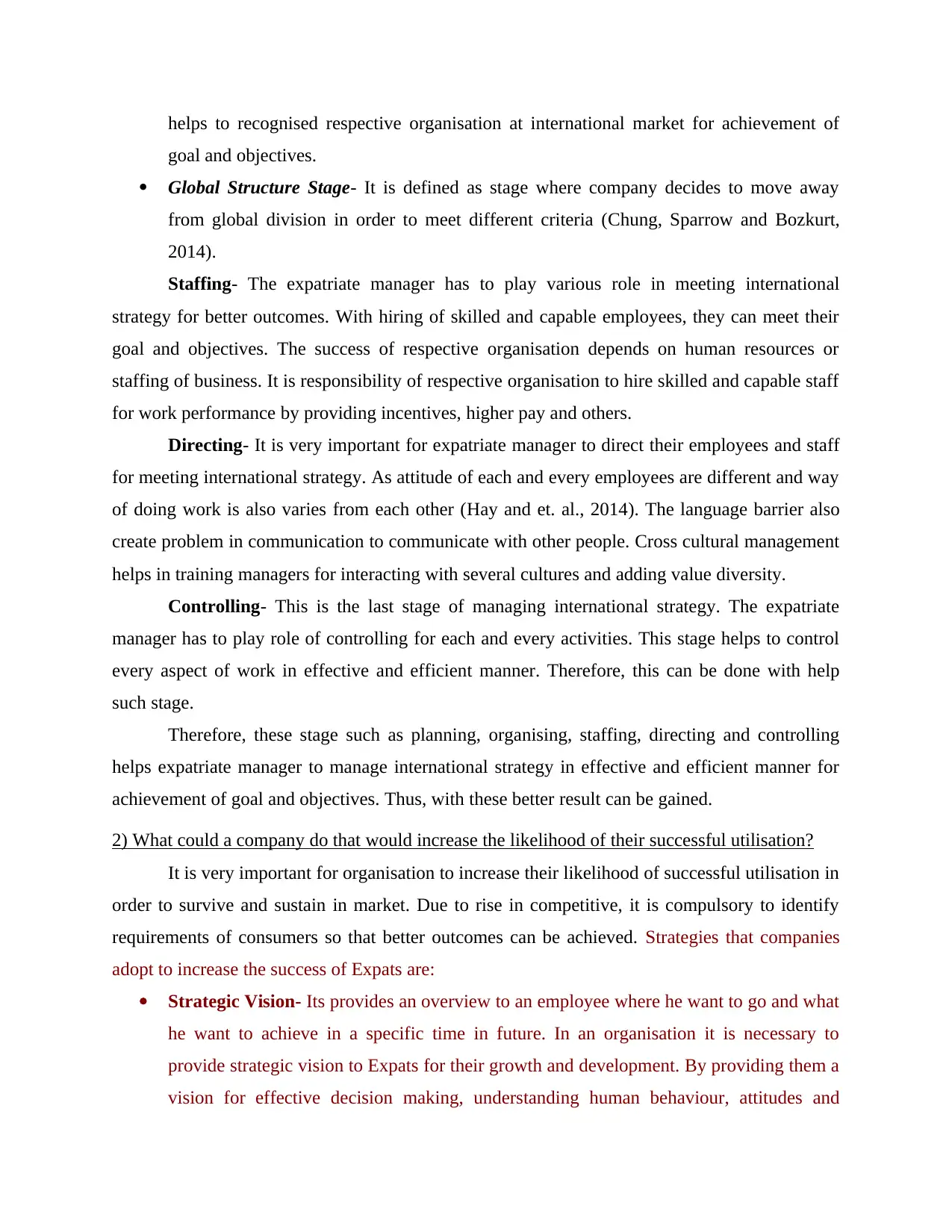
helps to recognised respective organisation at international market for achievement of
goal and objectives.
Global Structure Stage- It is defined as stage where company decides to move away
from global division in order to meet different criteria (Chung, Sparrow and Bozkurt,
2014).
Staffing- The expatriate manager has to play various role in meeting international
strategy for better outcomes. With hiring of skilled and capable employees, they can meet their
goal and objectives. The success of respective organisation depends on human resources or
staffing of business. It is responsibility of respective organisation to hire skilled and capable staff
for work performance by providing incentives, higher pay and others.
Directing- It is very important for expatriate manager to direct their employees and staff
for meeting international strategy. As attitude of each and every employees are different and way
of doing work is also varies from each other (Hay and et. al., 2014). The language barrier also
create problem in communication to communicate with other people. Cross cultural management
helps in training managers for interacting with several cultures and adding value diversity.
Controlling- This is the last stage of managing international strategy. The expatriate
manager has to play role of controlling for each and every activities. This stage helps to control
every aspect of work in effective and efficient manner. Therefore, this can be done with help
such stage.
Therefore, these stage such as planning, organising, staffing, directing and controlling
helps expatriate manager to manage international strategy in effective and efficient manner for
achievement of goal and objectives. Thus, with these better result can be gained.
2) What could a company do that would increase the likelihood of their successful utilisation?
It is very important for organisation to increase their likelihood of successful utilisation in
order to survive and sustain in market. Due to rise in competitive, it is compulsory to identify
requirements of consumers so that better outcomes can be achieved. Strategies that companies
adopt to increase the success of Expats are:
Strategic Vision- Its provides an overview to an employee where he want to go and what
he want to achieve in a specific time in future. In an organisation it is necessary to
provide strategic vision to Expats for their growth and development. By providing them a
vision for effective decision making, understanding human behaviour, attitudes and
goal and objectives.
Global Structure Stage- It is defined as stage where company decides to move away
from global division in order to meet different criteria (Chung, Sparrow and Bozkurt,
2014).
Staffing- The expatriate manager has to play various role in meeting international
strategy for better outcomes. With hiring of skilled and capable employees, they can meet their
goal and objectives. The success of respective organisation depends on human resources or
staffing of business. It is responsibility of respective organisation to hire skilled and capable staff
for work performance by providing incentives, higher pay and others.
Directing- It is very important for expatriate manager to direct their employees and staff
for meeting international strategy. As attitude of each and every employees are different and way
of doing work is also varies from each other (Hay and et. al., 2014). The language barrier also
create problem in communication to communicate with other people. Cross cultural management
helps in training managers for interacting with several cultures and adding value diversity.
Controlling- This is the last stage of managing international strategy. The expatriate
manager has to play role of controlling for each and every activities. This stage helps to control
every aspect of work in effective and efficient manner. Therefore, this can be done with help
such stage.
Therefore, these stage such as planning, organising, staffing, directing and controlling
helps expatriate manager to manage international strategy in effective and efficient manner for
achievement of goal and objectives. Thus, with these better result can be gained.
2) What could a company do that would increase the likelihood of their successful utilisation?
It is very important for organisation to increase their likelihood of successful utilisation in
order to survive and sustain in market. Due to rise in competitive, it is compulsory to identify
requirements of consumers so that better outcomes can be achieved. Strategies that companies
adopt to increase the success of Expats are:
Strategic Vision- Its provides an overview to an employee where he want to go and what
he want to achieve in a specific time in future. In an organisation it is necessary to
provide strategic vision to Expats for their growth and development. By providing them a
vision for effective decision making, understanding human behaviour, attitudes and
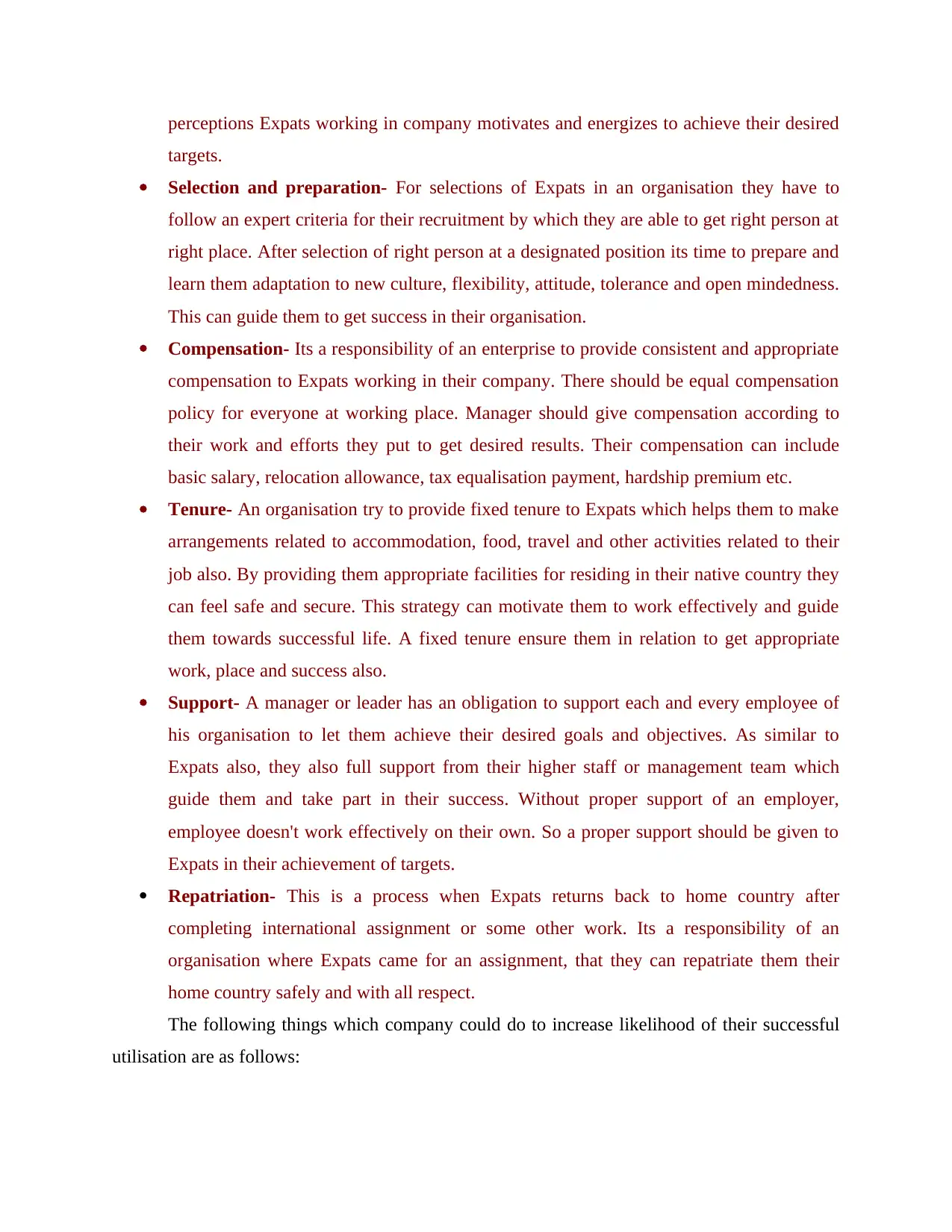
perceptions Expats working in company motivates and energizes to achieve their desired
targets.
Selection and preparation- For selections of Expats in an organisation they have to
follow an expert criteria for their recruitment by which they are able to get right person at
right place. After selection of right person at a designated position its time to prepare and
learn them adaptation to new culture, flexibility, attitude, tolerance and open mindedness.
This can guide them to get success in their organisation.
Compensation- Its a responsibility of an enterprise to provide consistent and appropriate
compensation to Expats working in their company. There should be equal compensation
policy for everyone at working place. Manager should give compensation according to
their work and efforts they put to get desired results. Their compensation can include
basic salary, relocation allowance, tax equalisation payment, hardship premium etc.
Tenure- An organisation try to provide fixed tenure to Expats which helps them to make
arrangements related to accommodation, food, travel and other activities related to their
job also. By providing them appropriate facilities for residing in their native country they
can feel safe and secure. This strategy can motivate them to work effectively and guide
them towards successful life. A fixed tenure ensure them in relation to get appropriate
work, place and success also.
Support- A manager or leader has an obligation to support each and every employee of
his organisation to let them achieve their desired goals and objectives. As similar to
Expats also, they also full support from their higher staff or management team which
guide them and take part in their success. Without proper support of an employer,
employee doesn't work effectively on their own. So a proper support should be given to
Expats in their achievement of targets.
Repatriation- This is a process when Expats returns back to home country after
completing international assignment or some other work. Its a responsibility of an
organisation where Expats came for an assignment, that they can repatriate them their
home country safely and with all respect.
The following things which company could do to increase likelihood of their successful
utilisation are as follows:
targets.
Selection and preparation- For selections of Expats in an organisation they have to
follow an expert criteria for their recruitment by which they are able to get right person at
right place. After selection of right person at a designated position its time to prepare and
learn them adaptation to new culture, flexibility, attitude, tolerance and open mindedness.
This can guide them to get success in their organisation.
Compensation- Its a responsibility of an enterprise to provide consistent and appropriate
compensation to Expats working in their company. There should be equal compensation
policy for everyone at working place. Manager should give compensation according to
their work and efforts they put to get desired results. Their compensation can include
basic salary, relocation allowance, tax equalisation payment, hardship premium etc.
Tenure- An organisation try to provide fixed tenure to Expats which helps them to make
arrangements related to accommodation, food, travel and other activities related to their
job also. By providing them appropriate facilities for residing in their native country they
can feel safe and secure. This strategy can motivate them to work effectively and guide
them towards successful life. A fixed tenure ensure them in relation to get appropriate
work, place and success also.
Support- A manager or leader has an obligation to support each and every employee of
his organisation to let them achieve their desired goals and objectives. As similar to
Expats also, they also full support from their higher staff or management team which
guide them and take part in their success. Without proper support of an employer,
employee doesn't work effectively on their own. So a proper support should be given to
Expats in their achievement of targets.
Repatriation- This is a process when Expats returns back to home country after
completing international assignment or some other work. Its a responsibility of an
organisation where Expats came for an assignment, that they can repatriate them their
home country safely and with all respect.
The following things which company could do to increase likelihood of their successful
utilisation are as follows:
⊘ This is a preview!⊘
Do you want full access?
Subscribe today to unlock all pages.

Trusted by 1+ million students worldwide
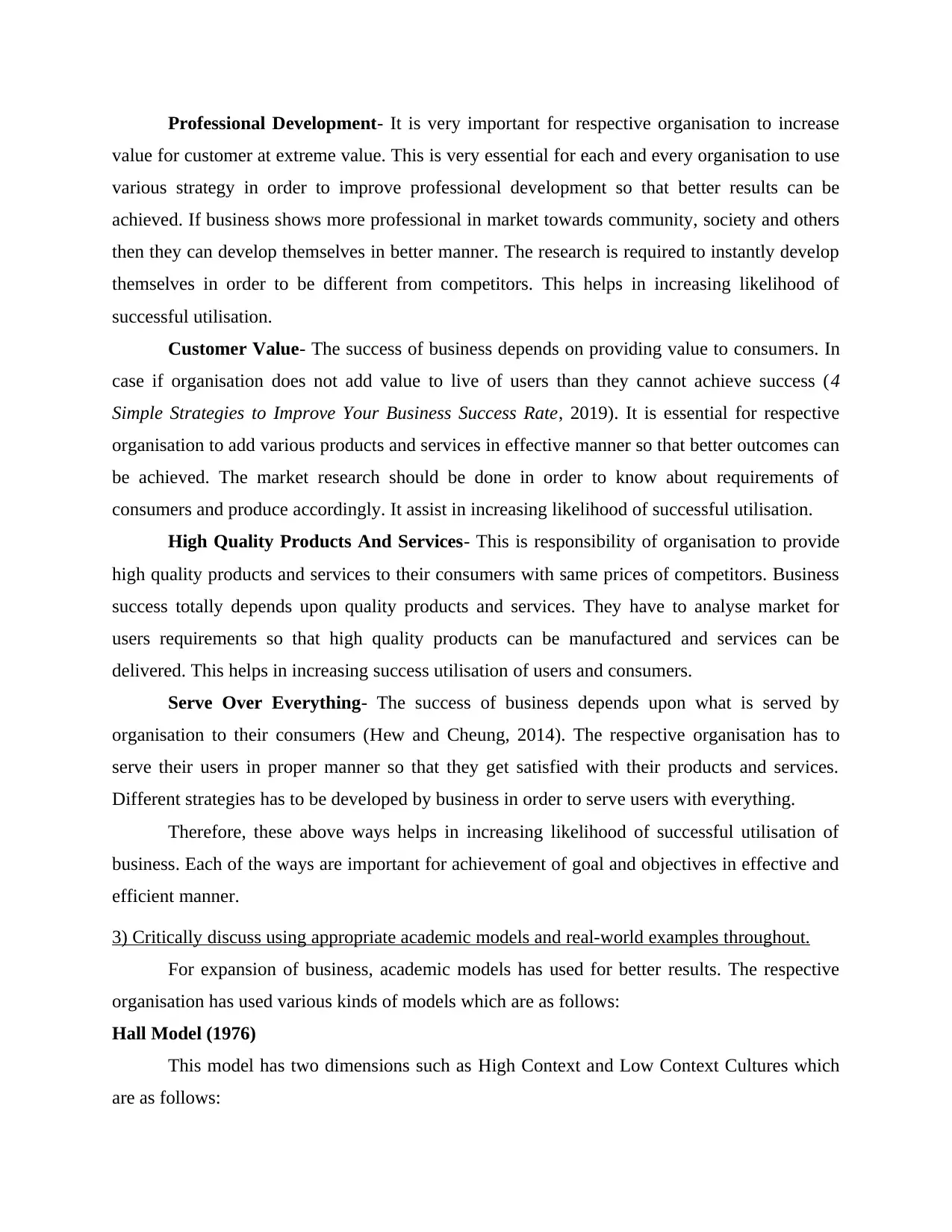
Professional Development- It is very important for respective organisation to increase
value for customer at extreme value. This is very essential for each and every organisation to use
various strategy in order to improve professional development so that better results can be
achieved. If business shows more professional in market towards community, society and others
then they can develop themselves in better manner. The research is required to instantly develop
themselves in order to be different from competitors. This helps in increasing likelihood of
successful utilisation.
Customer Value- The success of business depends on providing value to consumers. In
case if organisation does not add value to live of users than they cannot achieve success (4
Simple Strategies to Improve Your Business Success Rate, 2019). It is essential for respective
organisation to add various products and services in effective manner so that better outcomes can
be achieved. The market research should be done in order to know about requirements of
consumers and produce accordingly. It assist in increasing likelihood of successful utilisation.
High Quality Products And Services- This is responsibility of organisation to provide
high quality products and services to their consumers with same prices of competitors. Business
success totally depends upon quality products and services. They have to analyse market for
users requirements so that high quality products can be manufactured and services can be
delivered. This helps in increasing success utilisation of users and consumers.
Serve Over Everything- The success of business depends upon what is served by
organisation to their consumers (Hew and Cheung, 2014). The respective organisation has to
serve their users in proper manner so that they get satisfied with their products and services.
Different strategies has to be developed by business in order to serve users with everything.
Therefore, these above ways helps in increasing likelihood of successful utilisation of
business. Each of the ways are important for achievement of goal and objectives in effective and
efficient manner.
3) Critically discuss using appropriate academic models and real-world examples throughout.
For expansion of business, academic models has used for better results. The respective
organisation has used various kinds of models which are as follows:
Hall Model (1976)
This model has two dimensions such as High Context and Low Context Cultures which
are as follows:
value for customer at extreme value. This is very essential for each and every organisation to use
various strategy in order to improve professional development so that better results can be
achieved. If business shows more professional in market towards community, society and others
then they can develop themselves in better manner. The research is required to instantly develop
themselves in order to be different from competitors. This helps in increasing likelihood of
successful utilisation.
Customer Value- The success of business depends on providing value to consumers. In
case if organisation does not add value to live of users than they cannot achieve success (4
Simple Strategies to Improve Your Business Success Rate, 2019). It is essential for respective
organisation to add various products and services in effective manner so that better outcomes can
be achieved. The market research should be done in order to know about requirements of
consumers and produce accordingly. It assist in increasing likelihood of successful utilisation.
High Quality Products And Services- This is responsibility of organisation to provide
high quality products and services to their consumers with same prices of competitors. Business
success totally depends upon quality products and services. They have to analyse market for
users requirements so that high quality products can be manufactured and services can be
delivered. This helps in increasing success utilisation of users and consumers.
Serve Over Everything- The success of business depends upon what is served by
organisation to their consumers (Hew and Cheung, 2014). The respective organisation has to
serve their users in proper manner so that they get satisfied with their products and services.
Different strategies has to be developed by business in order to serve users with everything.
Therefore, these above ways helps in increasing likelihood of successful utilisation of
business. Each of the ways are important for achievement of goal and objectives in effective and
efficient manner.
3) Critically discuss using appropriate academic models and real-world examples throughout.
For expansion of business, academic models has used for better results. The respective
organisation has used various kinds of models which are as follows:
Hall Model (1976)
This model has two dimensions such as High Context and Low Context Cultures which
are as follows:
Paraphrase This Document
Need a fresh take? Get an instant paraphrase of this document with our AI Paraphraser
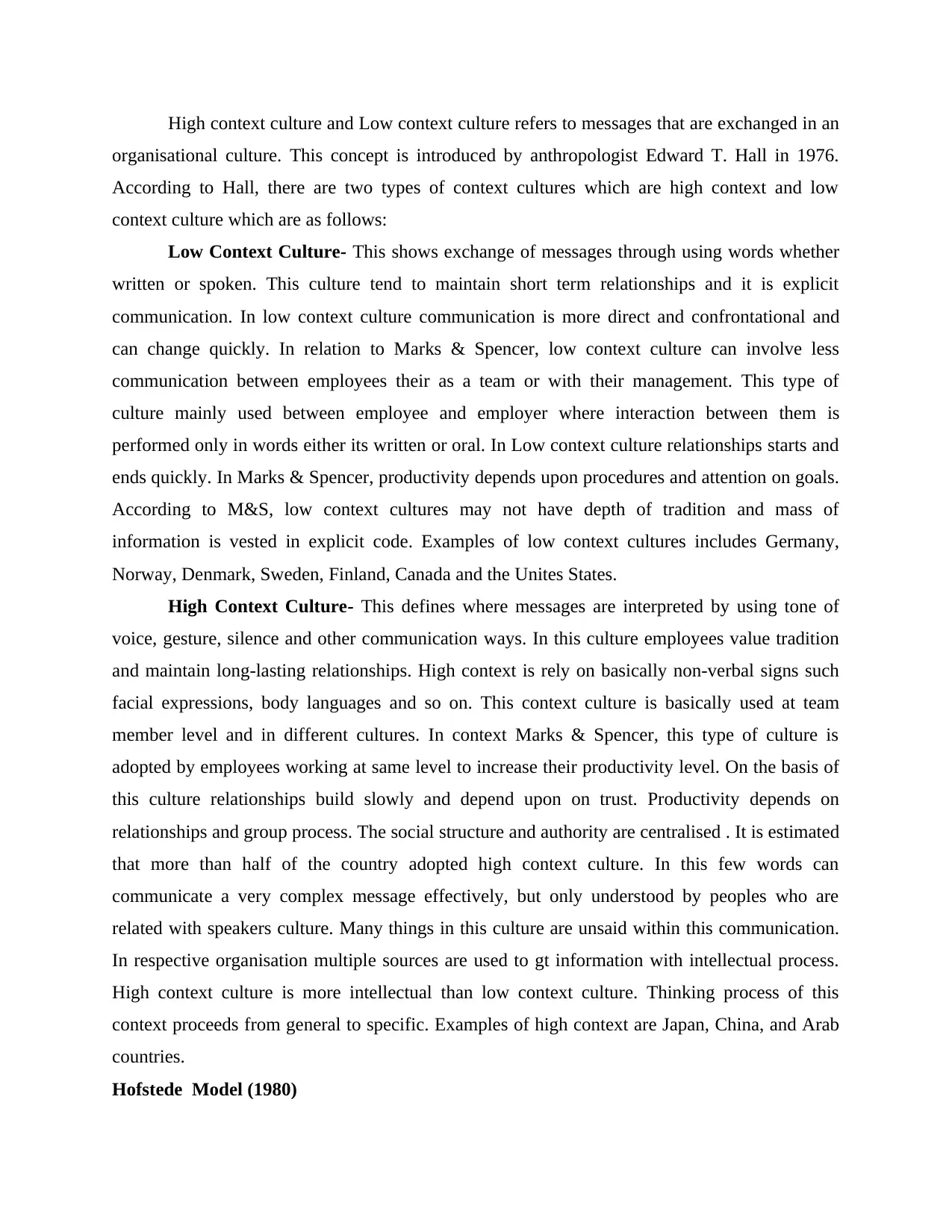
High context culture and Low context culture refers to messages that are exchanged in an
organisational culture. This concept is introduced by anthropologist Edward T. Hall in 1976.
According to Hall, there are two types of context cultures which are high context and low
context culture which are as follows:
Low Context Culture- This shows exchange of messages through using words whether
written or spoken. This culture tend to maintain short term relationships and it is explicit
communication. In low context culture communication is more direct and confrontational and
can change quickly. In relation to Marks & Spencer, low context culture can involve less
communication between employees their as a team or with their management. This type of
culture mainly used between employee and employer where interaction between them is
performed only in words either its written or oral. In Low context culture relationships starts and
ends quickly. In Marks & Spencer, productivity depends upon procedures and attention on goals.
According to M&S, low context cultures may not have depth of tradition and mass of
information is vested in explicit code. Examples of low context cultures includes Germany,
Norway, Denmark, Sweden, Finland, Canada and the Unites States.
High Context Culture- This defines where messages are interpreted by using tone of
voice, gesture, silence and other communication ways. In this culture employees value tradition
and maintain long-lasting relationships. High context is rely on basically non-verbal signs such
facial expressions, body languages and so on. This context culture is basically used at team
member level and in different cultures. In context Marks & Spencer, this type of culture is
adopted by employees working at same level to increase their productivity level. On the basis of
this culture relationships build slowly and depend upon on trust. Productivity depends on
relationships and group process. The social structure and authority are centralised . It is estimated
that more than half of the country adopted high context culture. In this few words can
communicate a very complex message effectively, but only understood by peoples who are
related with speakers culture. Many things in this culture are unsaid within this communication.
In respective organisation multiple sources are used to gt information with intellectual process.
High context culture is more intellectual than low context culture. Thinking process of this
context proceeds from general to specific. Examples of high context are Japan, China, and Arab
countries.
Hofstede Model (1980)
organisational culture. This concept is introduced by anthropologist Edward T. Hall in 1976.
According to Hall, there are two types of context cultures which are high context and low
context culture which are as follows:
Low Context Culture- This shows exchange of messages through using words whether
written or spoken. This culture tend to maintain short term relationships and it is explicit
communication. In low context culture communication is more direct and confrontational and
can change quickly. In relation to Marks & Spencer, low context culture can involve less
communication between employees their as a team or with their management. This type of
culture mainly used between employee and employer where interaction between them is
performed only in words either its written or oral. In Low context culture relationships starts and
ends quickly. In Marks & Spencer, productivity depends upon procedures and attention on goals.
According to M&S, low context cultures may not have depth of tradition and mass of
information is vested in explicit code. Examples of low context cultures includes Germany,
Norway, Denmark, Sweden, Finland, Canada and the Unites States.
High Context Culture- This defines where messages are interpreted by using tone of
voice, gesture, silence and other communication ways. In this culture employees value tradition
and maintain long-lasting relationships. High context is rely on basically non-verbal signs such
facial expressions, body languages and so on. This context culture is basically used at team
member level and in different cultures. In context Marks & Spencer, this type of culture is
adopted by employees working at same level to increase their productivity level. On the basis of
this culture relationships build slowly and depend upon on trust. Productivity depends on
relationships and group process. The social structure and authority are centralised . It is estimated
that more than half of the country adopted high context culture. In this few words can
communicate a very complex message effectively, but only understood by peoples who are
related with speakers culture. Many things in this culture are unsaid within this communication.
In respective organisation multiple sources are used to gt information with intellectual process.
High context culture is more intellectual than low context culture. Thinking process of this
context proceeds from general to specific. Examples of high context are Japan, China, and Arab
countries.
Hofstede Model (1980)
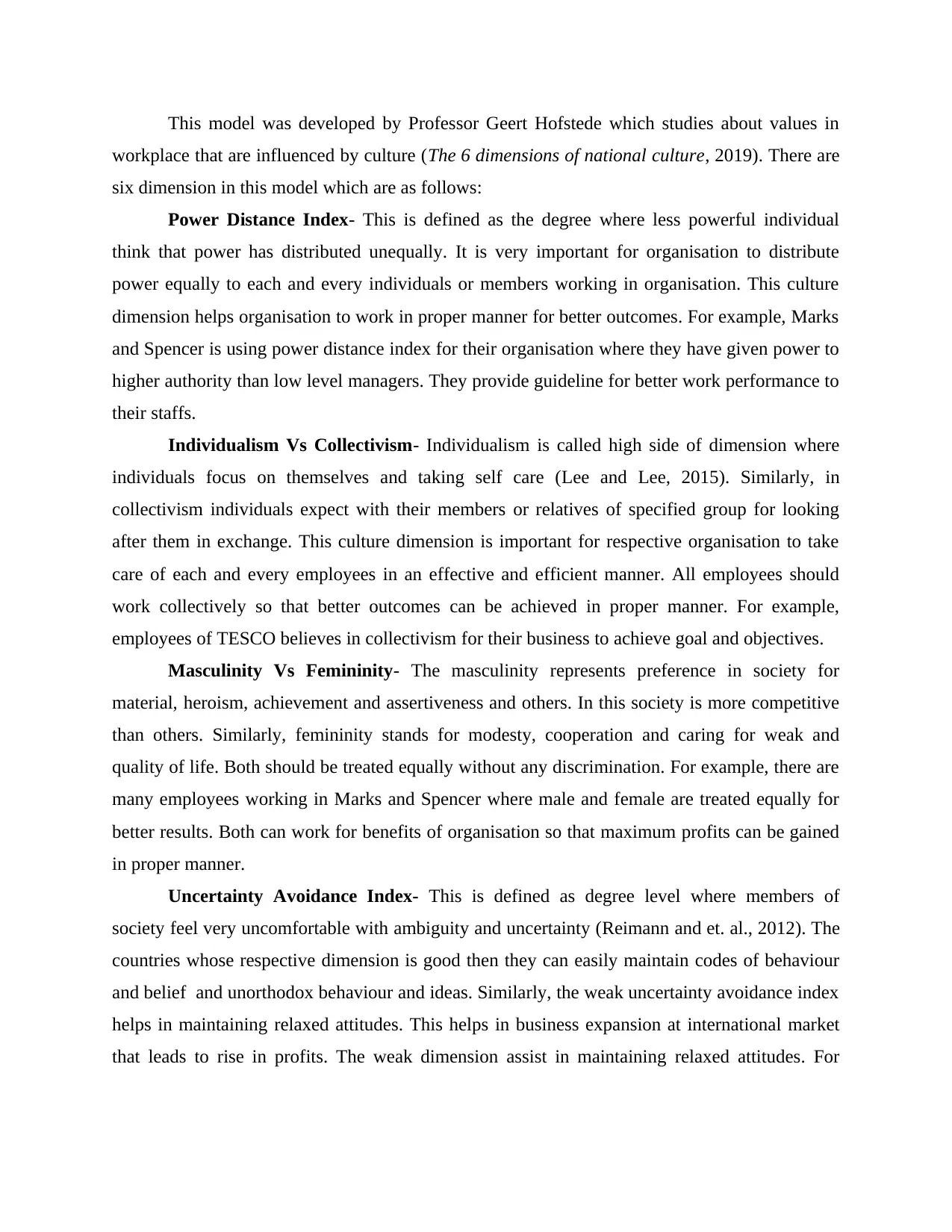
This model was developed by Professor Geert Hofstede which studies about values in
workplace that are influenced by culture (The 6 dimensions of national culture, 2019). There are
six dimension in this model which are as follows:
Power Distance Index- This is defined as the degree where less powerful individual
think that power has distributed unequally. It is very important for organisation to distribute
power equally to each and every individuals or members working in organisation. This culture
dimension helps organisation to work in proper manner for better outcomes. For example, Marks
and Spencer is using power distance index for their organisation where they have given power to
higher authority than low level managers. They provide guideline for better work performance to
their staffs.
Individualism Vs Collectivism- Individualism is called high side of dimension where
individuals focus on themselves and taking self care (Lee and Lee, 2015). Similarly, in
collectivism individuals expect with their members or relatives of specified group for looking
after them in exchange. This culture dimension is important for respective organisation to take
care of each and every employees in an effective and efficient manner. All employees should
work collectively so that better outcomes can be achieved in proper manner. For example,
employees of TESCO believes in collectivism for their business to achieve goal and objectives.
Masculinity Vs Femininity- The masculinity represents preference in society for
material, heroism, achievement and assertiveness and others. In this society is more competitive
than others. Similarly, femininity stands for modesty, cooperation and caring for weak and
quality of life. Both should be treated equally without any discrimination. For example, there are
many employees working in Marks and Spencer where male and female are treated equally for
better results. Both can work for benefits of organisation so that maximum profits can be gained
in proper manner.
Uncertainty Avoidance Index- This is defined as degree level where members of
society feel very uncomfortable with ambiguity and uncertainty (Reimann and et. al., 2012). The
countries whose respective dimension is good then they can easily maintain codes of behaviour
and belief and unorthodox behaviour and ideas. Similarly, the weak uncertainty avoidance index
helps in maintaining relaxed attitudes. This helps in business expansion at international market
that leads to rise in profits. The weak dimension assist in maintaining relaxed attitudes. For
workplace that are influenced by culture (The 6 dimensions of national culture, 2019). There are
six dimension in this model which are as follows:
Power Distance Index- This is defined as the degree where less powerful individual
think that power has distributed unequally. It is very important for organisation to distribute
power equally to each and every individuals or members working in organisation. This culture
dimension helps organisation to work in proper manner for better outcomes. For example, Marks
and Spencer is using power distance index for their organisation where they have given power to
higher authority than low level managers. They provide guideline for better work performance to
their staffs.
Individualism Vs Collectivism- Individualism is called high side of dimension where
individuals focus on themselves and taking self care (Lee and Lee, 2015). Similarly, in
collectivism individuals expect with their members or relatives of specified group for looking
after them in exchange. This culture dimension is important for respective organisation to take
care of each and every employees in an effective and efficient manner. All employees should
work collectively so that better outcomes can be achieved in proper manner. For example,
employees of TESCO believes in collectivism for their business to achieve goal and objectives.
Masculinity Vs Femininity- The masculinity represents preference in society for
material, heroism, achievement and assertiveness and others. In this society is more competitive
than others. Similarly, femininity stands for modesty, cooperation and caring for weak and
quality of life. Both should be treated equally without any discrimination. For example, there are
many employees working in Marks and Spencer where male and female are treated equally for
better results. Both can work for benefits of organisation so that maximum profits can be gained
in proper manner.
Uncertainty Avoidance Index- This is defined as degree level where members of
society feel very uncomfortable with ambiguity and uncertainty (Reimann and et. al., 2012). The
countries whose respective dimension is good then they can easily maintain codes of behaviour
and belief and unorthodox behaviour and ideas. Similarly, the weak uncertainty avoidance index
helps in maintaining relaxed attitudes. This helps in business expansion at international market
that leads to rise in profits. The weak dimension assist in maintaining relaxed attitudes. For
⊘ This is a preview!⊘
Do you want full access?
Subscribe today to unlock all pages.

Trusted by 1+ million students worldwide
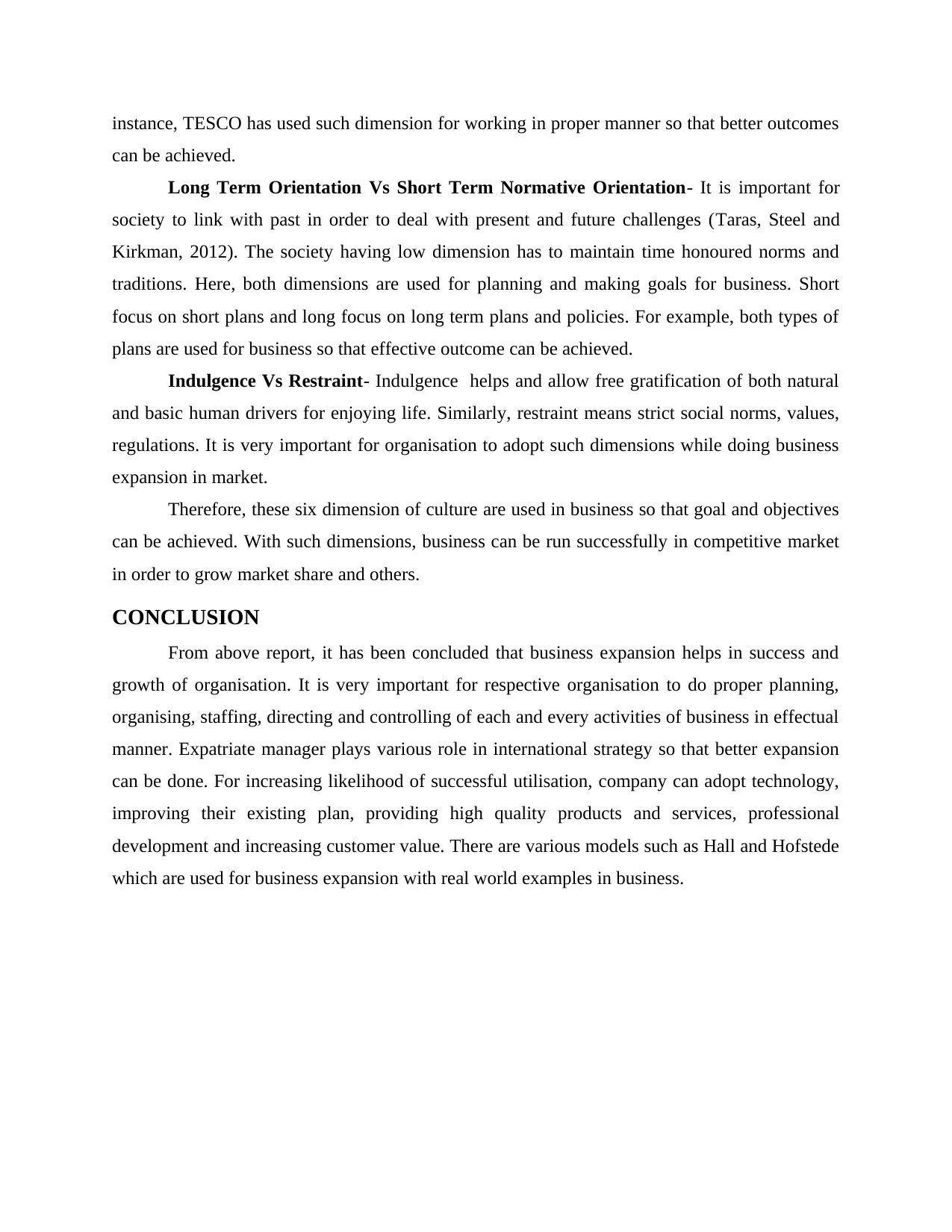
instance, TESCO has used such dimension for working in proper manner so that better outcomes
can be achieved.
Long Term Orientation Vs Short Term Normative Orientation- It is important for
society to link with past in order to deal with present and future challenges (Taras, Steel and
Kirkman, 2012). The society having low dimension has to maintain time honoured norms and
traditions. Here, both dimensions are used for planning and making goals for business. Short
focus on short plans and long focus on long term plans and policies. For example, both types of
plans are used for business so that effective outcome can be achieved.
Indulgence Vs Restraint- Indulgence helps and allow free gratification of both natural
and basic human drivers for enjoying life. Similarly, restraint means strict social norms, values,
regulations. It is very important for organisation to adopt such dimensions while doing business
expansion in market.
Therefore, these six dimension of culture are used in business so that goal and objectives
can be achieved. With such dimensions, business can be run successfully in competitive market
in order to grow market share and others.
CONCLUSION
From above report, it has been concluded that business expansion helps in success and
growth of organisation. It is very important for respective organisation to do proper planning,
organising, staffing, directing and controlling of each and every activities of business in effectual
manner. Expatriate manager plays various role in international strategy so that better expansion
can be done. For increasing likelihood of successful utilisation, company can adopt technology,
improving their existing plan, providing high quality products and services, professional
development and increasing customer value. There are various models such as Hall and Hofstede
which are used for business expansion with real world examples in business.
can be achieved.
Long Term Orientation Vs Short Term Normative Orientation- It is important for
society to link with past in order to deal with present and future challenges (Taras, Steel and
Kirkman, 2012). The society having low dimension has to maintain time honoured norms and
traditions. Here, both dimensions are used for planning and making goals for business. Short
focus on short plans and long focus on long term plans and policies. For example, both types of
plans are used for business so that effective outcome can be achieved.
Indulgence Vs Restraint- Indulgence helps and allow free gratification of both natural
and basic human drivers for enjoying life. Similarly, restraint means strict social norms, values,
regulations. It is very important for organisation to adopt such dimensions while doing business
expansion in market.
Therefore, these six dimension of culture are used in business so that goal and objectives
can be achieved. With such dimensions, business can be run successfully in competitive market
in order to grow market share and others.
CONCLUSION
From above report, it has been concluded that business expansion helps in success and
growth of organisation. It is very important for respective organisation to do proper planning,
organising, staffing, directing and controlling of each and every activities of business in effectual
manner. Expatriate manager plays various role in international strategy so that better expansion
can be done. For increasing likelihood of successful utilisation, company can adopt technology,
improving their existing plan, providing high quality products and services, professional
development and increasing customer value. There are various models such as Hall and Hofstede
which are used for business expansion with real world examples in business.
Paraphrase This Document
Need a fresh take? Get an instant paraphrase of this document with our AI Paraphraser
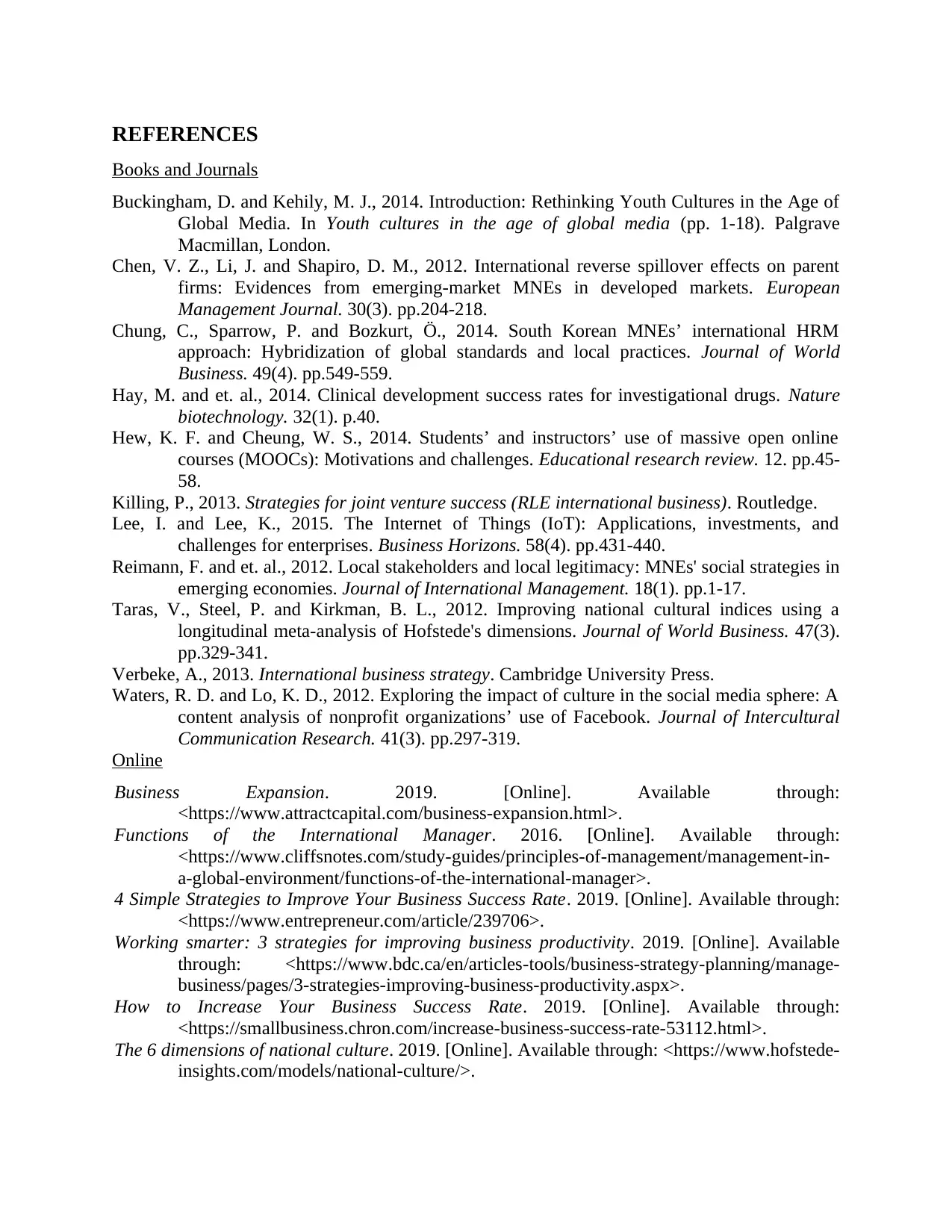
REFERENCES
Books and Journals
Buckingham, D. and Kehily, M. J., 2014. Introduction: Rethinking Youth Cultures in the Age of
Global Media. In Youth cultures in the age of global media (pp. 1-18). Palgrave
Macmillan, London.
Chen, V. Z., Li, J. and Shapiro, D. M., 2012. International reverse spillover effects on parent
firms: Evidences from emerging-market MNEs in developed markets. European
Management Journal. 30(3). pp.204-218.
Chung, C., Sparrow, P. and Bozkurt, Ö., 2014. South Korean MNEs’ international HRM
approach: Hybridization of global standards and local practices. Journal of World
Business. 49(4). pp.549-559.
Hay, M. and et. al., 2014. Clinical development success rates for investigational drugs. Nature
biotechnology. 32(1). p.40.
Hew, K. F. and Cheung, W. S., 2014. Students’ and instructors’ use of massive open online
courses (MOOCs): Motivations and challenges. Educational research review. 12. pp.45-
58.
Killing, P., 2013. Strategies for joint venture success (RLE international business). Routledge.
Lee, I. and Lee, K., 2015. The Internet of Things (IoT): Applications, investments, and
challenges for enterprises. Business Horizons. 58(4). pp.431-440.
Reimann, F. and et. al., 2012. Local stakeholders and local legitimacy: MNEs' social strategies in
emerging economies. Journal of International Management. 18(1). pp.1-17.
Taras, V., Steel, P. and Kirkman, B. L., 2012. Improving national cultural indices using a
longitudinal meta-analysis of Hofstede's dimensions. Journal of World Business. 47(3).
pp.329-341.
Verbeke, A., 2013. International business strategy. Cambridge University Press.
Waters, R. D. and Lo, K. D., 2012. Exploring the impact of culture in the social media sphere: A
content analysis of nonprofit organizations’ use of Facebook. Journal of Intercultural
Communication Research. 41(3). pp.297-319.
Online
Business Expansion. 2019. [Online]. Available through:
<https://www.attractcapital.com/business-expansion.html>.
Functions of the International Manager. 2016. [Online]. Available through:
<https://www.cliffsnotes.com/study-guides/principles-of-management/management-in-
a-global-environment/functions-of-the-international-manager>.
4 Simple Strategies to Improve Your Business Success Rate. 2019. [Online]. Available through:
<https://www.entrepreneur.com/article/239706>.
Working smarter: 3 strategies for improving business productivity. 2019. [Online]. Available
through: <https://www.bdc.ca/en/articles-tools/business-strategy-planning/manage-
business/pages/3-strategies-improving-business-productivity.aspx>.
How to Increase Your Business Success Rate. 2019. [Online]. Available through:
<https://smallbusiness.chron.com/increase-business-success-rate-53112.html>.
The 6 dimensions of national culture. 2019. [Online]. Available through: <https://www.hofstede-
insights.com/models/national-culture/>.
Books and Journals
Buckingham, D. and Kehily, M. J., 2014. Introduction: Rethinking Youth Cultures in the Age of
Global Media. In Youth cultures in the age of global media (pp. 1-18). Palgrave
Macmillan, London.
Chen, V. Z., Li, J. and Shapiro, D. M., 2012. International reverse spillover effects on parent
firms: Evidences from emerging-market MNEs in developed markets. European
Management Journal. 30(3). pp.204-218.
Chung, C., Sparrow, P. and Bozkurt, Ö., 2014. South Korean MNEs’ international HRM
approach: Hybridization of global standards and local practices. Journal of World
Business. 49(4). pp.549-559.
Hay, M. and et. al., 2014. Clinical development success rates for investigational drugs. Nature
biotechnology. 32(1). p.40.
Hew, K. F. and Cheung, W. S., 2014. Students’ and instructors’ use of massive open online
courses (MOOCs): Motivations and challenges. Educational research review. 12. pp.45-
58.
Killing, P., 2013. Strategies for joint venture success (RLE international business). Routledge.
Lee, I. and Lee, K., 2015. The Internet of Things (IoT): Applications, investments, and
challenges for enterprises. Business Horizons. 58(4). pp.431-440.
Reimann, F. and et. al., 2012. Local stakeholders and local legitimacy: MNEs' social strategies in
emerging economies. Journal of International Management. 18(1). pp.1-17.
Taras, V., Steel, P. and Kirkman, B. L., 2012. Improving national cultural indices using a
longitudinal meta-analysis of Hofstede's dimensions. Journal of World Business. 47(3).
pp.329-341.
Verbeke, A., 2013. International business strategy. Cambridge University Press.
Waters, R. D. and Lo, K. D., 2012. Exploring the impact of culture in the social media sphere: A
content analysis of nonprofit organizations’ use of Facebook. Journal of Intercultural
Communication Research. 41(3). pp.297-319.
Online
Business Expansion. 2019. [Online]. Available through:
<https://www.attractcapital.com/business-expansion.html>.
Functions of the International Manager. 2016. [Online]. Available through:
<https://www.cliffsnotes.com/study-guides/principles-of-management/management-in-
a-global-environment/functions-of-the-international-manager>.
4 Simple Strategies to Improve Your Business Success Rate. 2019. [Online]. Available through:
<https://www.entrepreneur.com/article/239706>.
Working smarter: 3 strategies for improving business productivity. 2019. [Online]. Available
through: <https://www.bdc.ca/en/articles-tools/business-strategy-planning/manage-
business/pages/3-strategies-improving-business-productivity.aspx>.
How to Increase Your Business Success Rate. 2019. [Online]. Available through:
<https://smallbusiness.chron.com/increase-business-success-rate-53112.html>.
The 6 dimensions of national culture. 2019. [Online]. Available through: <https://www.hofstede-
insights.com/models/national-culture/>.
1 out of 11
Related Documents
Your All-in-One AI-Powered Toolkit for Academic Success.
+13062052269
info@desklib.com
Available 24*7 on WhatsApp / Email
![[object Object]](/_next/static/media/star-bottom.7253800d.svg)
Unlock your academic potential
Copyright © 2020–2026 A2Z Services. All Rights Reserved. Developed and managed by ZUCOL.



